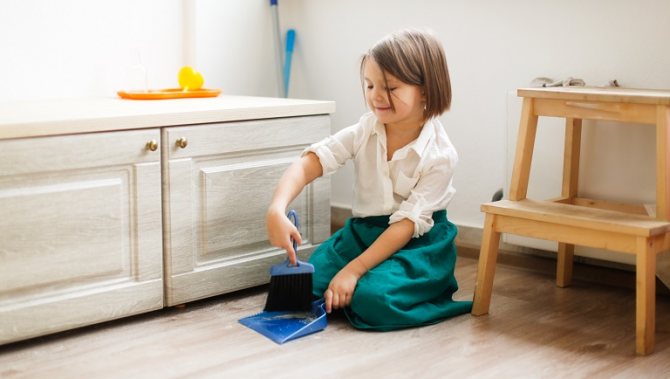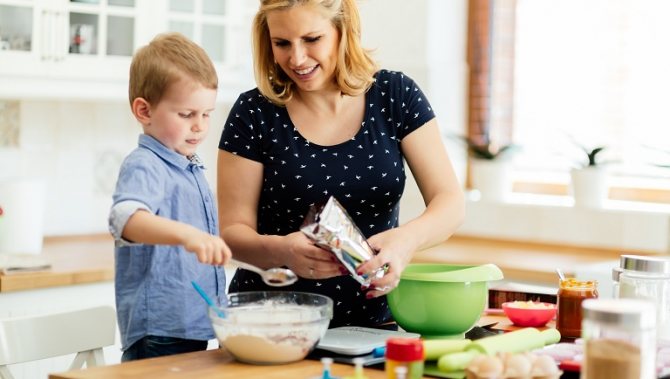Fostering independence in children is one of the most pressing issues for fathers and mothers who strive to teach their child to make choices, set goals, cope with problems and overcome obstacles. Independence fostered in children helps them take responsibility for themselves and their loved ones in adulthood.
Raising any child is a complex process in which parents often make mistakes, including when trying to teach their child to be independent.
What is independence?
When talking about an independent child, we most often imagine a toddler tying his shoelaces without outside help or enthusiastically playing in his room in splendid isolation. However, independence is a broader concept that goes beyond self-care and the ability to entertain oneself. Independence also means:
- initiative - the ability to act on one’s own impulse, and not at the request of an adult;
- responsibility - readiness to fulfill one’s promises and responsibilities, understanding the consequences that actions can lead to, as well as the awareness that personal success and achievements depend only on oneself;
- self-confidence and adequate self-esteem;
- ability to set and achieve goals, make decisions.
Not all adults can boast of a full set of these qualities. And at first glance, it may seem that a child does not become independent until high school age. This is a common misconception - in fact, independence is formed in early childhood (at 1.5-2 years), when the child begins to actively explore the world.
In fact, the presence of the above qualities symbolizes the child’s maturation - the more independent he is, the more he resembles an adult. He is able to take care of himself, adequately assess the danger and make a decision in a critical situation. This has a positive impact on your studies, friendships, family relationships and future careers.
Why does a child grow up dependent?
Most often, the reason for a child’s lack of independence lies in the behavior of his parents. It is parents who make their children dependent by choosing an unsuccessful style of family education, which one way or another stifles children's initiative and responsibility in the bud. These are the reasons:
- Excessive control : dictating a child’s actions is convenient - it saves a lot of time, but it only teaches you to follow commands and not set tasks for yourself. He grows up to be an excellent performer, but he is not able to do anything on his own.
- Overprotection : in fear for the health and future of the child, parents surround him with excessive care, performing most tasks for him - from self-care to choosing friends. The child gets used to others doing everything for him, and turns out to be unprepared for adult life, where he needs to make decisions on his own, show initiative and bear responsibility.
- Inflated expectations : when parents expect certain achievements, while not attaching importance to intermediate successes. In the absence of incentive (praise), the child loses motivation, does not realize the value of his daily efforts and small victories, and his self-esteem rapidly declines.
- Unwillingness to accept the child's growing up : some parents find it difficult to come to terms with the fact that a child may have his own opinion - different from theirs; they strive to protect him from mistakes that are obvious to them, prohibiting certain things. This provokes conflicts, and if parents gain the upper hand, the child loses self-confidence and control over his own life.
These are common reasons that encourage parents to suppress children's independence. In practice, in everyday life, this manifests itself in the following things:
- parents try to keep their child busy as much as possible, depriving him of free time;
- They are used to being overly on the safe side: they don’t leave the child at home alone, they don’t allow them to use household appliances, etc.;
- live by the principle “it’s easier to do it yourself than to teach a child”;
- fails to demonstrate a worthy personal example.
Nurturing independence is the art of gradually letting go of a child, accepting his growing up, the ability to have his own point of view, make mistakes and learn from them. If this is not done on time, in the future the child will hardly:
- will achieve success in his career because he will not be able to defend his professional opinion in the team and before his superiors;
- will be able to take responsibility for his family and children because he lacks this skill;
- will take risks, strive for change, because he is afraid of the unknown and is not confident in his abilities.
Progress of the game:
1) The teacher brings the doll and says that the doll is very tired and wants to sleep, asks the children to help her undress.
2) Children, one by one, at the direction of the teacher, remove the clothes from the doll and, carefully folding them, place them on a chair.
The teacher guides their actions, helping to correctly fold this or that part of the doll’s toilet, showing how to do it correctly. The doll is completely undressed (only panties and a beacon are left), they put slippers on her and lead her to the bed. Having put the doll to bed, the teacher turns her on her side, carefully covers her, gently strokes her head and says “Sleep!”
. Having shown the children that the doll has fallen asleep, the teacher asks them to be quiet.
3) Evaluation of the game: during the game, it turned out that most of the children undressed the doll correctly and in a certain sequence, but not all children were able to neatly fold the clothes on the high chair. Sasha, Christina, Olya could not unfasten the buttons on the dress. Boys don't know how to turn their tights inside out.
In the future, in order to improve children's independence outcomes, it is necessary to draw the attention of parents to this problem and encourage them to provide their children with more independence during dressing and undressing. Conclusion
Conclusion
Our group has done a lot of work to develop children’s independence in self-care. As a result of this work, most children have already developed basic self-care skills: kids know how to put on and take off clothes themselves, unzip a jacket, put clothes away in a locker, and carefully hang clothes on a high chair after undressing. Children know how to hold a spoon, eat soup from a plate, drink from a mug, wipe their mouth with a napkin, wash their hands, wring out their hands and dry with their towel. As a result of this, we began to devote more time to organizing a variety of educational activities: motor, play, speech, music, experimentation. In our opinion, we were able to make the life of children in kindergarten more interesting.
Dealing in depth with the problem of developing independence in young children, we see the need to continue this work with children at the next age stage.
Thus, we can draw the following conclusion:
Timely mastery of self-service processes gives the child the opportunity to assert himself, feel independent and skillful. Gradually the habit of cleanliness, neatness and neatness is formed. During the period of developing self-service skills, you need to remember that the child’s skills and abilities are formed gradually, but with constant and systematic work in this direction.
We noticed the following:
- children free from adult care become more independent and confident in their abilities. By serving themselves, they begin to understand the value of adult care and gradually show concern for their loved ones;
— self-care work increases the body’s performance and endurance, develops dexterity, coordination of movements, and provides aesthetic pleasure;
— constancy and unity of requirements from the kindergarten and the family for children ensure the strength of skills, create the prerequisites for the formation of the need for cleanliness and tidiness, and the habit of self-service.
Literature
1. Volzhanina T. Nurturing independence: advice to parents of children of all ages \\ “Grapes”
-2010-№37.
2. Gubanova N. F. Development of gaming activities: junior group. - M.: MOSAIC-SYNTHESIS, 2014.-128 p. Educational and methodological kit for the program “From birth to school”
.
3. Krasnoshchekova N. V. “Plot-role-playing games for preschool children”
.-Ed.
8-Rostov n\D: Phoenix, 2014.-251 p. — (School of Development)
4. Mikhailenko N., Korotkova N. “Organization of story-based games in kindergarten”
A manual for educators. 3rd edition, rev. Moscow, LINK-PRESS.
5. Federal state educational standard for preschool education.. – Access mode: https://Ministry of Education and Science. rf/news/3447/file/2280/13.06.14-FSES-DO. pdf
Stages of developing independence in children

Independence is a kind of instinct that is inherent in us by nature to ensure the survival of the species. It first appears at the age of 1.5-2 years, when the child begins the “I myself” period. From this age, it is important to encourage expressions of independence, and, if necessary, gently push the child to perform certain actions.
1.5-3 years
This period is accompanied by the acquisition of basic self-care skills: the child learns to eat, drink, dress, wash himself, etc. He is very inquisitive and strives to understand the world around him. It is important to support him in all his endeavors, trying to provide him with maximum freedom, while not forgetting about safety measures.
3-5 years

It is a difficult age when a child begins to feel like an independent person (as it seems to him) from his parents. The need to be independent at this age is very high: the child tries to “grope” the boundaries of what is permitted, argues with parents on any issue, tries to prove that he is right, even if he himself understands that he is wrong. Not all parents are ready for such behavior, and often “kill” the independence of their children with parental authority. By the age of 5, the child:
- cleans his room independently (collects toys, makes the bed, puts things in the closet);
- participates in cleaning the house (wipes dust, puts things in their places);
- helps in preparing food - performs simple tasks under the supervision of parents (grease the pan with oil, add flour to the dough, mix the salad, etc.);
- pours himself water or juice from a bag or bottle;
- takes care of the pet (able to feed and clean up after the pet).
At the age of 3-5 years, children form a scenario according to which they will later build their lives: the nature of relationships with people, behavior in critical situations, etc. Psychological traumas of this period are what the child will return to throughout his life. own life. The task of parents is to minimize these traumas and form a strong foundation in life that will give the child a good start in life.
6-12 years
When a child enters school, a new area of responsibility appears—study. Gradually, he acquires the skills of planning his time, learns to be responsible for his things at school and in preparation for it (pack a briefcase, take a uniform for physical education, etc.). This is a period when the child is still attached to his parents, but is already quite independent on his own. By age 12 he:
- completes homework independently;
- has his own household responsibilities along with adults (takes out the trash, fully cleans his room, can buy groceries, etc.);
- monitors the cleanliness of his clothes, takes things to the laundry in a timely manner without reminding his parents;
- cares for the pet (walks, feeds, cleans without prompting);
- treats adults with respect;
By the beginning of adolescence, the child is completely independent in self-care and learning - he does not need reminders or control in these areas.
Adolescence 12+
Personal independence is the last stage that is important to complete on time. At this time, it is necessary to give the child more freedom, to allow him to make his own decisions. If in the early stages parents did not stop the child’s attempts at independence, then in puberty there should not be any serious problems with this.
However, conflicts with parents during adolescence are inevitable. There is an opinion that they are due to the need to separate children from their parents in order to create their own families and have children. A century ago, by the age of 18-20, a person could be called an adult: he was truly ready to create and provide for a family and raise offspring. Today, according to Rosstat, the average citizen of our country gets married at the age of 25-34 years. Modern psychologists explain this by the so-called “epidemic of infantility” of the new generation. That is why they recommend paying great attention to the development of independence skills in children.
Why is this necessary?
The concept of independence includes not only self-care skills. There is such an education in it as arbitrariness. Due to it, a person controls his behavior. The child’s success at school depends on this.
With good development of the level of arbitrariness, it is easy for a student to sit in class, concentrate on the task, and absorb the material. This quality has a positive effect on the formation of adaptation to society. The reaction of the social group depends on how correctly and quickly the child adopts the norms of behavior.
Voluntariness serves as the basis for the following skills:
- Ability to obey rules.
- Orientation in the system of requirements.
- Hear and listen to others, follow verbal instructions.
- The ability to perform an action based on a visual model.
In preschool age, a child is more prone to impulsiveness and situational behavior. Therefore, you should not expect instant changes from him. From the age of four, you need to help him develop control over his actions.
What mistakes do parents make?
All parents strive to raise their children to be independent, but sometimes they unknowingly make mistakes that have the opposite effect. The roughest of them:
- doing for a child what he is able to do himself is easier, faster, safer, more effective, but more detrimental to independence;
- letting your child perform an action on his own, and then redoing it before his eyes - this practice kills the desire to try it yourself next time - why, if the mother will do it much better anyway?
- impose help and advice - in this way the child is deprived of the opportunity to try to solve the problem himself; if this happens regularly, this skill never has time to develop;
- invade the child’s personal space: burst into the room without knocking, put personal belongings in order, check pockets - such actions deprive the child of a sense of security in his own home;
- untimeliness - discrepancy between the set of skills that are being taught and the age of the child;
- punish for the consequences - scold the child if his attempt to show independence ended in a complete fiasco (broke a plate, ruined clothes, etc.);
- use an imperative tone when communicating with a child - this tone allows you to achieve obedience, but solely out of fear, and not because of awareness of the essence of the problem;
- “rescue” at the last moment - coming to the aid of a child who has reached the end, doing housework or homework for him, thereby depriving him of the opportunity to feel the consequences of his disorganization and laziness.
Give your child a choice
What should parents do if they want to develop their child’s independence? Your baby should be able to make independent choices in everyday situations :
- what toy he wants to play with;
- orange or apple for breakfast;
- will draw with pencils or paints;
- what he wants to draw;
- walk with dad in the yard or go with mom to visit her friend.
And, of course, you can’t completely suppress a child’s initiatives. Adults just need to be sure to control the boundaries of children’s behavior. This is necessary in order to guarantee the safety of the child’s activities. Children do not have the skill to anticipate danger. It also needs to be shaped, just like the development of independence.
How to raise a child to be independent?

No matter how old a child is - 2 years old or 18 years old - it is never too late to help him become more independent. To do this, you should follow simple rules.
- Always be interested in the child's wishes and preferences . This applies to food, leisure, profession, hobbies, etc. From the first years of life, a child must firmly know what he wants and learn to make decisions on his own.
- Allow to make mistakes and not make a tragedy out of a mistake . Mistakes are an experience; the child must understand that everyone makes mistakes, learn a lesson and try again.
- Providing assistance according to the principle “Help me do it myself” is one of the principles of Maria Montessori’s early development method, aimed at developing independence in children from 2 years old. It consists of explaining how to do this or that action on your own, and not performing it instead of the child;
- Involve in household responsibilities from an early age . Each child should have his own area of responsibility - this is his contribution to the family as a full member. A two-year-old baby can easily help his mother in the kitchen, put away his toys and wipe the sink after himself. At first, parents should monitor the fulfillment of these responsibilities, then only remind them, and already at school age the child’s responsibility is fully formed.
- Make sure that the child has enough free time (at least 1-2 hours a day) . This will help him identify things that are truly interesting to him, and not imposed by parents or teachers.
- Consult . Involving your child in discussions about household chores is beneficial for building a child's self-worth. Consult with your child about what outfit you should wear, what to buy for dinner, and what gift to choose for your older brother.
- Set a positive example . By demonstrating your best qualities, you create a favorable atmosphere in the family, which has the best effect on the child’s personality.
These are general recommendations that every parent should follow. Perhaps you instinctively follow these tips - this suggests that you have chosen the optimal style for raising your children - democratic.
Here are some more practical tips on how to develop certain qualities in your child.
Complex tasks
Children of senior preschool and primary school age often have difficulty completing complex tasks. They are simply not able to keep in mind all the components and the order of their implementation. To help them overcome these difficulties, you should:
- break the task into small blocks (bring clothes from the closet - put on trousers and a T-shirt - put on boots - take a briefcase);
- recite each block to the child for several days;
- replace verbal accompaniment with graphic or text prompts (pictures or a list of blocks), that is, let the child get ready without your help;
- achieve complete independence.
This simple algorithm works even in cases with hyperactive children and saves a lot of time and effort for parents. It can be used for cleaning the room (clear the table, under the bed, on the floor - take dirty things to the laundry - make the bed), table setting (arrange plates - lay out napkins - get cutlery - put glasses), morning hygiene measures (wake up - wash your face - brush your teeth - take off your pajamas - make the bed - put on clothes), etc.
Self-organization
Teaching a child to manage their time wisely is not an easy task, but an important one. Self-organization is not only about punctuality, but also about time efficiency and personal productivity. Some tips for parents:
- hang or place clocks throughout the house so that they are always in front of the child’s eyes, even better - buy him a wristwatch (not a smart watch or a smartphone - unnecessary functions will distract him from the main thing);
- to speed up the daily routine (washing, changing clothes, breakfast), use timers or hourglasses so that the child learns to quickly get ready for school;
- if a student has difficulty getting up early, you can set a new alarm every morning or record a message with a hint where you hid a treat for breakfast, another option is to record his own voice as an alarm melody: children like to listen to themselves in the recording, this will speed up awakening and will make getting up easier.
If you want your child to be independent, do not stop him from taking initiative and making mistakes, be there to make sure he is safe and help if you are asked to do so. Maximum freedom in accordance with age is the most important condition for growing up and the harmonious development of a child’s personality.

Trainer for thinking development
The simulator is a database of 4,000 tasks designed specifically to develop the thinking skills of students in grades 1-4
learn more
A few words about the concept of “independence”
Independence is often understood as a specific property of an individual that helps to realize oneself as a person. Currently, teachers and psychologists pay a lot of attention to the development of children's independence during the period of preparing preschool children for the start of school. This is the most important period in the development of a child’s personality.
If a child is independent, he takes initiative and takes a responsible approach to any activity. Independent children exhibit some independence. Whether it's a gaming or educational activity.





